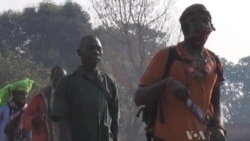BANGUI —
Authorities in the Central African Republic (CAR) have declared war on the anti-balaka. The militia are accused of carrying out horrific attacks against Muslim civilians that have forced tens of thousands to flee the county in the past month.
Bands of young men - some armed with everything from machetes and homemade firearms to military-grade equipment - continue to roam the country. They call themselves the anti-balaka.
They are accused of slaughtering Muslim civilians as revenge for atrocities committed by the Muslim Seleka rebel coalition during its nine months in power.
Many say they came to the capital, Bangui, to fight Seleka in December and force out the government of Seleka leader, Michel Djotodia.
But international troops in CAR say they are "outlaws" as the movement devolved into looting and mob violence.
Some anti-balaka turned to setting up roadblocks on country roads - teenagers brandishing weapons and extorting money.
French and African troops are responding with force to disarm them. Mediation could prove difficult. This loose federation of militia groups has several leaders claiming to speak on its behalf.
Some say continued insecurity here is the work of "uncontrolled elements" and "fake anti-balaka."
Joachim Kokate represented the anti-balaka at a regional summit in January.
"It is the time for justice. We just need to target those organizing theft, looting and extrajudicial killings. They should be sought out, arrested and turned over to the authorities and they will answer for their acts," said Kokate.
Many anti-balaka tell VOA they want the same treatment Seleka rebels are getting. They want to be barracked, paid, fed and given the chance to join the national army as part of disarmament.
Some anti-balaka see themselves as liberators of the country.
The militia are recognizable by the talisman they wear.
In Bangui, anti-balaka member Emotion Namsio, points to the small wrapped pouches on necklaces that hang like thick garland around a fellow member's neck.
"See this, a Kalashinkov bullet," he said, "you could fire on him and it wouldn't go through. You could stab him and it wouldn't go through. And there are others. Grenades can't hurt us."
The conflict here has increasingly been cast as sectarian.
But the anti-balaka - made up of both animists and Christians - insist their mission is patriotic, not religious.
Their leaders say the anti-balaka number in the tens of thousands.
The movement has its roots in self-defense militias that have been around, primarily in the west, since the 1990s. They were locals' response to general lawlessness and state indifference.
Those militias were joined by ex-military loyal to former president Francois Bozize after he was ousted by Seleka last March.
French and African Union troops continue to recover large caches of weapons and munitions from the militia and have made some arrests.
Bands of young men - some armed with everything from machetes and homemade firearms to military-grade equipment - continue to roam the country. They call themselves the anti-balaka.
They are accused of slaughtering Muslim civilians as revenge for atrocities committed by the Muslim Seleka rebel coalition during its nine months in power.
Many say they came to the capital, Bangui, to fight Seleka in December and force out the government of Seleka leader, Michel Djotodia.
But international troops in CAR say they are "outlaws" as the movement devolved into looting and mob violence.
Some anti-balaka turned to setting up roadblocks on country roads - teenagers brandishing weapons and extorting money.
French and African troops are responding with force to disarm them. Mediation could prove difficult. This loose federation of militia groups has several leaders claiming to speak on its behalf.
Some say continued insecurity here is the work of "uncontrolled elements" and "fake anti-balaka."
Joachim Kokate represented the anti-balaka at a regional summit in January.
"It is the time for justice. We just need to target those organizing theft, looting and extrajudicial killings. They should be sought out, arrested and turned over to the authorities and they will answer for their acts," said Kokate.
Many anti-balaka tell VOA they want the same treatment Seleka rebels are getting. They want to be barracked, paid, fed and given the chance to join the national army as part of disarmament.
Some anti-balaka see themselves as liberators of the country.
The militia are recognizable by the talisman they wear.
In Bangui, anti-balaka member Emotion Namsio, points to the small wrapped pouches on necklaces that hang like thick garland around a fellow member's neck.
"See this, a Kalashinkov bullet," he said, "you could fire on him and it wouldn't go through. You could stab him and it wouldn't go through. And there are others. Grenades can't hurt us."
The conflict here has increasingly been cast as sectarian.
But the anti-balaka - made up of both animists and Christians - insist their mission is patriotic, not religious.
Their leaders say the anti-balaka number in the tens of thousands.
The movement has its roots in self-defense militias that have been around, primarily in the west, since the 1990s. They were locals' response to general lawlessness and state indifference.
Those militias were joined by ex-military loyal to former president Francois Bozize after he was ousted by Seleka last March.
French and African Union troops continue to recover large caches of weapons and munitions from the militia and have made some arrests.





